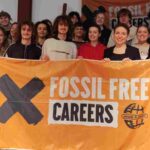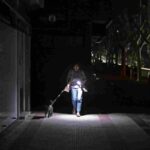Three wildfires are currently tearing through various parts of Greater Los Angeles, with tens of thousands of people ordered to evacuate. As of 6pm on Wednesday 8 January, the three fires, are covering over 6,500 acres between them. The Palisades fire – the first to ignite on Tuesday 7 January, is burning more than 5,000 acres. So far it has burned many homes, businesses, and famous landmarks:

The Eaton fire, which is currently at more than 1,000 acres, has burnt many homes in Altadena and Pasadena. Over 52,000 residents have been told to evacuate.
Thirdly, the Hurst fire has burned more than 500 acres in the area around Sylmar. Authorities have issued evacuation orders for over 30,000 people, as they expect the situation to get worse on Wednesday, due to fast-moving winds:
Wildfires have rapidly engulfed Los Angeles, leading to evacuation orders for 30,000 residents. In Pacific Palisades, numerous multi-million dollar homes have been obliterated, and hundreds of vehicles have been left stranded on the roads.
Pray for California 🙏 pic.twitter.com/uqBuTEAsld
— Daily Dose of X (@schuld_eth) January 8, 2025
One resident of Santa Monica told the Canary:
I am just devastated. Pacific Palisades is a beautiful community – and Malibu. It’s heartbreaking
🚨 NEW: Major parts of Pacific Palisades has essentially been wiped off the map as the sun rises in Los Angeles
Countless homes and businesses have been turned to ash
And the fire is still 0% contained. pic.twitter.com/bSJxj3diZe
— Nick Sortor (@nicksortor) January 8, 2025
Santa Ana winds devastating the Pacific Palisades
Santa Ana winds, also known as ‘devil winds’, are fast-moving, warm, and dry winds. They originate inland and blow towards the coast of Southern California.
Much of Southern California, and LA in particular, has experienced an extremely dry winter and barely any rain for the last eight months. The last time a significant amount of rainfall fell was last May, which has contributed to drought. Unfortunately, the dry conditions and strong winds created the perfect storm for wildfires.
Back in 2021, another fire in the Palisades burnt through more than 1,200 acres.
The point of no return
Major disasters such as wildfires are becoming more and more common due to the climate crisis. In recent years we have seen a number of devastating wildfires – such as on Maui and in Europe in 2023. However, we are nearly at the point of no return.
And while these latest wildfires are a reminder that the climate crisis is already here and wrecking lives, the fact it’s happening at the start of 2025 only makes it all the worse. Why? Because hitting the mid-decade marks another Paris Climate Agreement milestone missed.
Alarmingly, the United Nations has warned in no uncertain terms what the world’s failure to curb emissions will mean for the planet:
The Paris Agreement is a legally binding international treaty on climate change. It was adopted by 196 Parties at the UN Climate Change Conference (COP21) in Paris, France, on 12 December 2015. It entered into force on 4 November 2016.
Its overarching goal is to hold “the increase in the global average temperature to well below 2°C above pre-industrial levels” and pursue efforts “to limit the temperature increase to 1.5°C above pre-industrial levels.”
However, in recent years, world leaders have stressed the need to limit global warming to 1.5°C by the end of this century.
That’s because the UN’s Intergovernmental Panel on Climate Change indicates that crossing the 1.5°C threshold risks unleashing far more severe climate change impacts, including more frequent and severe droughts, heatwaves and rainfall.
To limit global warming to 1.5°C, greenhouse gas emissions must peak before 2025 at the latest and decline 43% by 2030.
We are only eight days into 2025, and already fires are tearing through Southern California. If this isn’t enough for legislators to pull their fingers out of their arses, then nothing will be:
Has anyone mentioned that this worst case scenario fire is happening in the winter? Fortunately our elected officials have prepared for this moment by defunding the fire department & climate emergency mobilization department in order to give more money to LAPD. https://t.co/kp56TLMQ50 pic.twitter.com/wyFIrTHSot
— People’s City Council – Los Angeles (@PplsCityCouncil) January 8, 2025
In short, we’re already staring at the brink of the runaway climate crisis. LA right now, specifically the Pacific Palisades, is one snapshot of what this looks like:

Marginalised communities bear the brunt
As will all major disasters, there is no doubt that marginalised communities will suffer the most. LA county already announced that there are only 100 shelter beds for people experiencing homelessness. Current figures suggest that there are over 75,000 unhoused people in LA county. What good will 100 measly beds do?
In response to the massive fires raging all over Los Angeles + record high winds, the county has let us know there are only 100 shelter beds. 100.
60,000 ppl live outside in LA County.
The same day the LA city council voted to move 200k in homelessness funds to LAPD overtime. pic.twitter.com/P8ddCey7iZ
— Housing 4 All is Hot (@ahouse4all) January 8, 2025
Similarly, disabled people – homeless or not – are in even greater danger:
Lots of people sharing concern for pets. I’ve not seen one post with concern for the tens of thousands of homeless people in the path of this fire. Many of them are disabled, not able to quickly more. #palisadesfire
— Mark Horvath (@hardlynormal) January 8, 2025

Pacific Palisades: carry on like normal?
Now 2025 has arrived, we are at the tipping point for being able to save the planet from the climate catastrophe. With the climate crisis raging a week in, how can we act like the world isn’t on fire?
On a personal level – I have good friends in LA and the Pacific Palisades, some of whom I hadn’t heard from when I started writing this article.
Luckily, I now have.
But the level of fear I felt, when I am over 8,500km away, tells me that for my friends in and around the area of the fires the level of fear must be off the scale. Thousands of people are now – once again – without homes and losing loved ones.
We are literally watching the planet burn around us. How are we supposed to just carry on as normal?
Feature image via Jane Richardson and Keith Sackler, and additional images via Jane Richardson and Keith Sackler





















